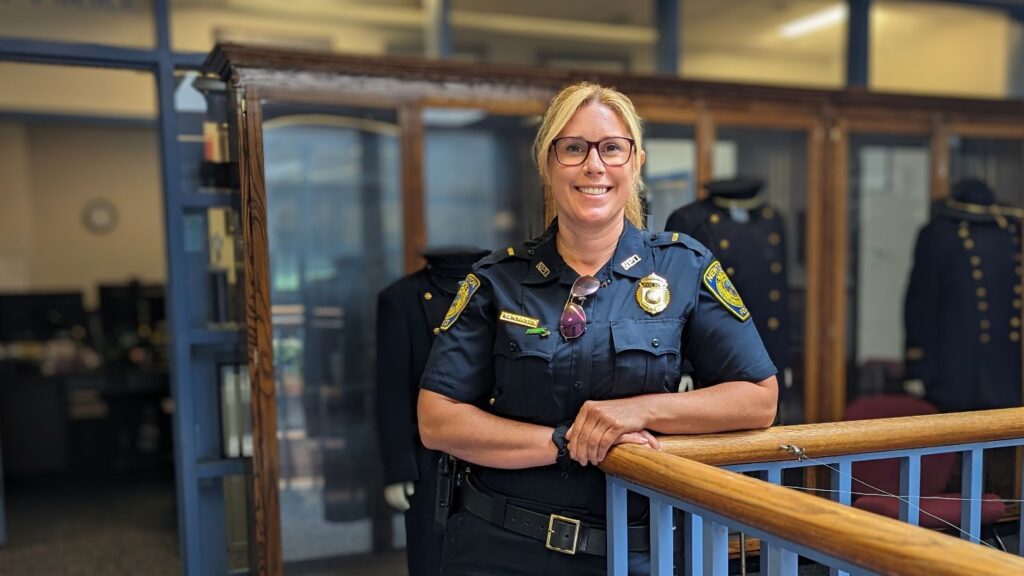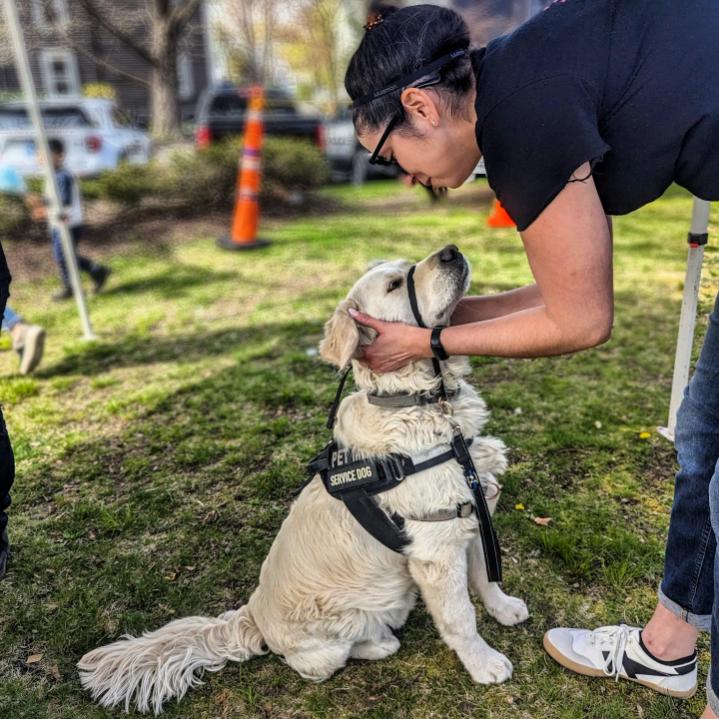Truck2
Newton Police Department hosted its Touch-a-Truck event on April 27, a sensory-friendly event for families to meet members of the department and enjoy some outdoor fun. Photo by Bryan McGonigle
Newton, like the rest of the country, has had a rough time lately—inflation has families panicked, there’s been a rise in hate crimes, and everyone seems to be on edge all the time—and the Newton police want to help the community feel safe again.
The Newton Police Department is focusing efforts on community policing, engagement and building a bigger in-person presence that residents and workers and visitors can rely on.
“It’s important that we make sure that we’re focusing on the areas of our community that need focus,” Lt. Amanda Henrickson said in a recent meeting with the Beacon. “So, we focus on where there’s the most activity. Our parks, our village squares and our city business districts, where there seems to be the most congregation of people.”
Sidewalk patrols
For starters, the department has launched Safe Sidewalks, which puts police officers on beats patrolling sidewalks and parks on foot and on bicycle. It’s a way of making police interaction easier for the public, Officer Joseph Brooks said.
“I think a big thing with that is we are more accessible to the public if we’re on foot or on bicycles, as opposed to sitting in a car or driving around,” Brooks, who serves as public information officer, said. “You have more face-to-face interaction. It’s a more natural interaction than if it happens to be on a traffic stop or something like that.”
It allows police to meet new people they otherwise may not even see if they were driving in patrol cars.
“Foot patrols work,” Henrickson said. “There have been police studies throughout the country that show that with increased uniform presence, it helps people feel safer.”
That feeling of safety was rattled last summer when there were two gruesome murders—a triple homicide and a domestic abuse situation that ended in murder—in the span of just a few weeks.
Then, after Hamas launched a terror attack in Israel that killed more than 1,200 Israelis, hate crimes increased in Newton and there was a loud, nearly riotous protest at a Palestinian art exhibit at the Newton Free Library.
And last month, someone emailed a bomb threat to the New Arts Center just before a drag queen story hour event was to be held there.
“Our community has suffered many tragedies, and we have been the victims of violent crimes,” Henrickson said. “And so it’s important from a police and public safety perspective that people feel safe.”
The department has received a lot of requests for patrols in certain neighborhoods, Henrickson added, but officers driving around in cruisers are often called away from their routes for emergencies.
Safe Sidewalks adds extra patrols by foot and bicycle, with a grant from the Department of Justice.
“Thankfully, due to this grant, and we are hopefully going to be able to take all the feedback we’ve gotten and then hopefully bring a similar project back to the community next year,” Henrickson said.

Bridging divides
Police across the nation have faced scrutiny over the past few years, especially since the death of George Floyd at the hands of a Minneapolis police officer that ignited protests across the country.
It’s also led to an invisible wall between police departments and the public, as police are put on the defensive.
“When you have something like what happened to George Floyd happen, policing in general gets painted with this broad brush,” Brooks said. “But one bad apple doesn’t rot a tree, right? So by the same token, coming back to the Police Department, you hear all this criticism of the police, but it’s not the entire community that’s criticizing.
“So being able to go out and interact, I think one has been beneficial for the community to see us, but I think it’s been equally, if not more, beneficial for members of our department to get out there and have these positive interactions too, to remember that we’re all in this together,” Brooks continued. “We’re all in the same community. We all want the best for each other.”
National Night Out
One big event for such interaction is National Night Out, a nationwide police and firefighting event in which communities gather, enjoy food, check out fire trucks and talk with police.
“We are very excited to be hosting that hopefully the weather is agreeable and cooperative, because it’s a one night only,” Henrickson said.
National Night Out started in 1984, with the first year’s event held in 400 communities across 23 states, according to the National Night Out website, and grew to include 17,000 communities nationwide.
“We’ll have touch-a-truck, there’ll be food. We have cotton candy, popcorn, a bounce house. There’ll be live music by the Irish Whisper. It’s just a fun night.”

Cops and Kids
Each summer the Community Services Bureau also runs a free program called “Cops and Kids,” for middle school-aged children.
“It’s a great two-week program where our youth officers are able to interact with these children outside of a school setting, and they’re able to build relationships, have positive interactions, and it’s really helpful.”
Community Police Academy
For the adults, there will be an opportunity to engage with police in the Community Police Academy.
Several years have passed since the last time Newton held this program, and the department is bringing it back to add another layer to its community engagement focus.
“It’s basically like an educational introduction to what we do here,” Brooks said. “We’ll have officers from the department volunteer to teach areas that they feel like they’re proficient in. And we can expand on motor vehicle laws, the first responder stuff that we do.”
Community Police Academy will also include opportunity for firearm certification.
Feeling safe
Henrickson said the department is also working on creating a self-defense class for residents.
“Our focus in the Newton Police Department has always been that we’re a service-based police department, where the spirit of community policing is strong here, and that’s always been our mission, and our goal is to just let people know that we’re here to serve them.”
“We’re here to do our best to ensure the public safety,” Henrickson said. “And so we want to continue building on those relationships, forming new relationships with members of the community, and at the very least people just know we’re here for them, and that we always want to make sure that people feel safe.”